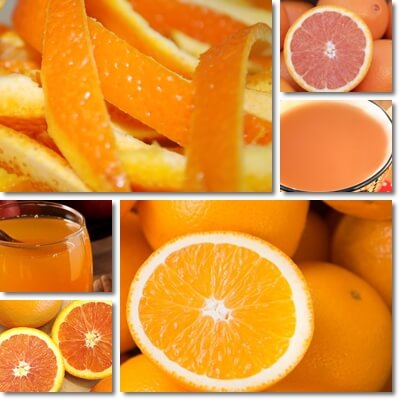Do you like drinking orange tea? Have you ever wanted to make it yourself at home from the best ingredients and add only things you like? Homemade is the best made, and often times healthier and tastier. Homemade orange tea is a good option for anyone with food allergies, sensitivities and intolerances because it allows complete control over the ingredients used. If there’s something you can’t eat, or simply don’t want to, but fear might somehow find its way into your tea, the safest thing to do is to start making your own orange tea at home. Here are 5 orange tea recipes with instructions on how to make them, and an additional two recipes for a decaf orange tea and a orange tea for high blood pressure.
Recipe no. 1: Simple homemade orange peel tea
Purchase organic oranges, any kind you like – choose between these 18 different types of oranges. Wash the whole fruit and tap dry with a paper towel. Cut the peel with as much white pith as you’d like, air-dry over the course of one or more weeks or oven-dry and grind into a fine powder using a plain food processor or even pestle and mortar. Bring water to a boil, add 1-2 teaspoons of ground orange peel to a cup/8 oz/240 ml of water, cover and infuse for 5-15 minutes or stir continuously to help release the bioactive and flavor compounds in the peel.

Once the tea is infused and has cooled down, sweeten with white or brown sugar, maple syrup or your favorite raw honey. To keep things interesting, you can opt for healthy raw orange blossom honey, or manuka honey which both has a unique taste and solid antibacterial properties (learn more about manuka honey grading system and choose the strongest and healthiest manuka honey grade). Know that plain orange peel tea is not very flavorful and may even taste bitter if too much peel is used which is why most people prefer orange-flavored teas that are essentially other herbal teas infused with orange peel.
Recipe no. 2: Homemade orange peel and juice tea
Orange peel and juice tea, if made right, is nutritious and healthier than plain orange peel tea because it has essential vitamins and minerals from the juice, which the plain tea doesn’t have, and additional benefits for health. To make this tea, prepare your own dried orange peel as per the instructions in the previous recipe. Bring a cup of water to a boil, add 1-2 teaspoons of ground orange peel and infuse for 5-15 minutes or stir continuously during this time.
Once the tea is infused with the peel and has cooled down almost to room temperature, add half a cup of fresh orange juice, stir and then sweeten per taste. You can use common sweet orange juice for a more refreshing tea, or acidless orange juice if you have acid reflux disease or gastritis. Choose Cara Cara orange juice which has lycopene with blood pressure-lowering properties, or blood orange juice which has anthocyanin antioxidants with scientifically proven anticancer properties. Or go for tangelos such as Honeybells which are sweeter, juicier and healthy.

Adding fresh, home-made orange juice to your tepid orange peel tea enriches the tea with antioxidant compounds such as hesperidin, and vitamin C with anti-inflammatory benefits and benefits for immunity. Store-bought orange juice with pulp, while somewhat bitter, is also a good choice because it is rich in hesperidin.
Recipe no. 3: Homemade infused orange peel tea with red fruit
Make your own dried orange peel as per the instructions in the first recipe. Bring water to a boil and infuse 1 teabag or 1 teaspoon of red fruit and 1 teaspoon of dried orange peel per cup/8 oz/240 ml for 5-15 minutes, either covered or stirred continuously. Once tepid, sweeten to your liking.
You can also add blood orange juice to the tea and get anthocyanin antioxidants with scientifically proven anticancer properties. Red apples are also a good match for orange tea, maybe spiced with cinnamon, and so are red raspberries, red cherries, redcurrants and cranberries. Another option is to add some fresh red raspberry juice, cherry juice, redcurrant or cranberry juice to the orange tea for unique flavors.
Recipe no. 4: Classic cinnamon tea infused with orange peel
Prepare your dried orange peel as per previous instructions and bring water to a boil. In one cup/8 oz/240 ml of hot water infuse 1 teaspoon of dried orange peel and 1 cinnamon tea bag/1 small cinnamon stick/half a teaspoon of cinnamon powder. Either cover and leave for 5-15 minutes, or stir continuously to help release bioactive and flavor compounds. You can remove the teabag and strain the tea once the optimal level of flavor has been achieved, then sweeten to your liking once tepid.
Cinnamon not only pairs well with orange, but is also a natural digestive and a source of benefits for gastritis, stomach ulcers and diabetes. Cinnamon helps calm stomach pain and reduce bloating, excessive burping and flatulence.
See the benefits of cinnamon tea.
Recipe no. 5: Homemade green or black tea, orange peel-infused
Prepare your dried orange peel as per previous instructions and bring water to a boil. In one cup/8 oz/240 ml of hot water infuse 1 teaspoon of dried orange peel and 1 green tea or black tea bag, 2 for a stronger taste. Alternatively, you can use a teaspoon of loose-leaf green tea or black tea. Either cover and leave for 5-15 minutes, or stir continuously to help release bioactive and flavor compounds. You can remove the teabag or strain the tea once the optimal level of flavor has been achieved, then sweeten to your liking once tepid.
Orange tea with a base of green tea or black tea is known to boost a slow metabolism and exert a stimulant action on the nervous system, increasing alertness and productivity.
See more benefits of orange tea.
Bonus recipe: Decaf orange peel tea
Store-bought orange tea is often times made with a base of black tea, green tea or even white tea. However, these teas are natural sources of caffeine, the same caffeine found in coffee. If you are suffering from anxiety, insomnia, agitation, or with elevated stress levels, then caffeine is the last thing you need. But you can always make a decaf orange peel tea.
Prepare your dried orange peel as per previous instructions and bring water to a boil. In one cup/8 oz/240 ml of hot water infuse 1 teaspoon of dried orange peel and 1 chicory root tea bag, 2 for a stronger taste. Alternatively, you can use a teaspoon of chicory powder. Either cover and leave for 5-15 minutes, or stir continuously to help release bioactive and flavor compounds. You can strain the tea once the optimal level of flavor has been achieved, then sweeten to your liking once tepid.
Bonus recipe: Orange tea for high blood pressure
If you like orange tea and are looking for a natural solution to lower your blood pressure numbers at the same time, this is a tea recipe to solve all of your problems. Prepare your dried orange peel as per previous instructions and bring water to a boil. In one cup/8 oz/240 ml of hot water infuse 1 teaspoon of dried orange peel together with 1 teabag or 1 teaspoon of the following tea herbs:
- rose hip berries
- hawthorn berries
- hawthorn leaf
- mixed hawthorn tea material (berries, flowers, leaves, twigs)
See the benefits of hawthorn for high blood pressure.
Either cover and leave for 5-15 minutes, or stir continuously to help release bioactive and flavor compounds. You can remove the teabag or strain the tea once the optimal level of flavor has been achieved, then sweeten to your liking once tepid.
Alternatively, add one of the following juices to the tepid orange peel tea (50-100 ml or to taste):
- Sea-buckthorn juice (an extreme source of vitamin C and a good source of dietary potassium).
- Fresh or store-bought Cara Cara orange juice (great source of lycopene which is also heat-stable).
